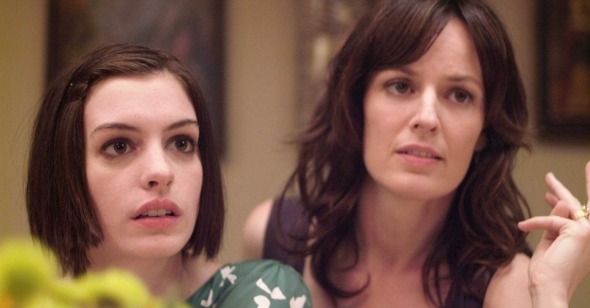We Regretfully Decline
by Michael Koresky
Rachel Getting Married
Dir. Jonathan Demme, U.S., Sony Pictures Classics
What if Jonathan Demme threw a party and asked you to come? You’d probably initially be flattered by the invitation; after all, the Oscar-winning director and longtime music scenester has certainly racked up an impressive roster of friends over the years. But while it sure would be swell to hang out with a random cross-section of multiculti hepcats for a couple of hours, eventually you’d probably feel that you don’t quite belong. This is the feeling I got not long into Demme’s new self-consciously “back-to-basics” independent film, Rachel Getting Married, in which he shoots a script written by Sidney Lumet’s daughter as an excuse to throw a backyard soirée celebrating his handpicked community of actors, musicians, and artist friends. There’s gobs of tragic backstory and family grudges in Jenny Lumet’s script, but it all gets lost in Demme’s mammoth mixer. The wild wedding at the center of Rachel Getting Married is a simultaneously alienating and ingratiating affair—the film wants you to join the party but keeps reminding you you’re probably not cool enough to be invited.
Rachel Getting Married is a work of enormous self-promotion in more ways that just this however. Shot with the kind of camerawork that immediately announces itself as somehow inherently more “real” by virtue of its being handheld (what is this, 1992?), Rachel Getting Married seems intended to remind viewers of Demme’s vitality as a fiction filmmaker, his youthful, just-off-mainstream persona. Yet there’s something fishy right off the bat: the purposely awkward, off-center framing of Anne Hathaway’s Kym, smoking a cigarette outside of the rehab clinic she’s leaving to attend her sister Rachel’s wedding; the hectic hurrying of the camera as it tries to keep up with her as she rushes through her house; the look-at-me jump cuts as in-your-face and choppy as Hathaway’s harrowing split ends. The more Rachel Getting Married screams “Truth!” at its audience, the less truthful, of course, it becomes.
Which is a shame, because if Demme had ditched the pretense, he might have had a passable little family melodrama. As the black-sheep former addict of her clan, Hathaway appears properly movie-star mussed, looking distended and gawky, forced to wear ill-fitting zip-up sweaters and angry-girl eye makeup (later, she’ll pee in a cup and shave her armpits on camera). The question isn’t so much whether or not she can keep her raging rivers of narcissism in check long enough so as not to ruin her sister’s big day as it is when Rachel (Rosemarie DeWitt) will learn to accept Kym on her own, misbegotten terms. DeWitt, conveying a wounded history of sibling rivalry with ease, is the standout in the cast, and Hathaway comes across much better when paired with her. The film’s best scene (both in terms of performance and camera placement) comes after the rehearsal dinner, when Rachel upbraids Kym in front of their father for the bald-faced self-interest and rambling incoherence of Kym’s “toast” at dinner. It’s the first time we see the roiling anger below the surface of the family erupt, and the one-upmanship between the two girls is strikingly vivid. This is Lumet’s most incisive stuff—the just barely concealed resentment, the angling for parental approbation—and if she didn’t continue to burden the characters with wild behavior and over-the-top outbursts (a late-film Mildred Pierce slapfest between Kym and her mother, played otherwise with an unsettling reserve by Debra Winger, is a particularly risible moment) the film might have functioned better as a mini-portrait of a family trying to move on after a long period of grief.
But then Demme goes and squanders whatever interest we’ve accrued in these people with his meticulously messy nuptials, an interminable affair so blinkered by its own wealthy bohemia that it doesn’t seem to realize its cultural appropriation of Indian wedding customs (all the women are in saris) is obnoxious exoticism, plain and simple. And this is where Demme really lets his friends loose: In the backyard of her huge Connecticut house, Rachel gets married to TV on the Radio’s Tunde Adebimpe, while being serenaded by Robyn Hitchcock, DJ’d by New York nightclub staple Anita Sarko, entertained by famous Jamaican performer Sister Carol East, and flanked by belly-dancers. Demme, apparently feeling that what his audience really wants for his film’s third-act resolution is concert footage, lets his cameras run and run. And we watch and watch from our chairs as his actors and buddies frolic and dance, endlessly. And every once in a while Demme cuts to Hathaway, looking off pensively, so we don’t forget that we’re watching, in fact, a narrative.
